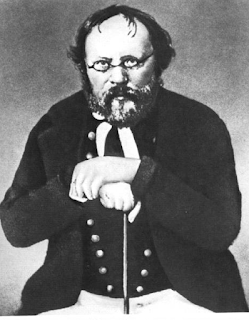One thing we’ve
noticed (i.e., had driven home to us
like a railroad spike through the skull) is that quite a large number of people
are confused about the difference between a general principle, and a particular
application of that same principle. Yet
all the sciences, moral philosophy, and even theology are based in some measure
on this distinction.
 |
| Euclid: "Lessee, 2 + 2 = pons asinorum..." |
Take, for
example, the science of mathematics.
Euclid’s First Element is, “Things
which equal the same thing also equal one another.” Thus, if 1 + 3 = 4, and 2 + 2 = 4, then you
can be absolutely certain that 1 + 3 = 2 + 2, no ifs, ands, or buts. The general principle, “Things which equal
the same thing also equal one another,” is applied in the specific (or
“particular”) equations 1 + 3 and 2 + 2.
In moral philosophy, the universal
prohibition against theft, i.e., the general
norm of the natural law, “Thou shalt not steal” demonstrates that the right to
be an owner, “the right to private property,” comes under the natural law. Why? Everyone
everywhere knows that it is contrary to nature, i.e., “wrong,” to take what does not belong to you. This necessarily implies that private
property is a right by nature, or it would not be wrong to take what does not
belong to you.
 |
| Proudhon: "Property is theft ... except for my stuff." |
Proudhon’s “Property is
theft” means “property is a violation of property,” which is utter nonsense. All the socialist and redistributist
arguments ever advanced since humanity came down from the trees are based on
proving to the satisfaction of the thief that 1) the ostensible owner of what
the thief desires doesn’t really own, 2) because the thief is either the real
owner, or acting on behalf of the real owner.
The right to be an owner,
however, says nothing about any specific system of political economy. As long as the system respects the dignity of
each human person in a way that secures universal access to the means of
acquiring and possessing private property in capital, then it conforms to the
general norm of the natural law.
We won’t bother with an
example from theology. We’d first have
to make the case for the general principle, and then the application, and we’ve
already done enough with science and philosophy.
We can — and must — however,
deal with the natural right of liberty, also known as freedom of association or
contract, which is what started us on today’s brief journey into the murky
waters of logic . . . murky, that is, in a day and age that has pretty much
rejected reason as the basis for anything.
Freedom sounds very nice —
and it is. Under the name “liberty” it
is almost always included in the great triad of natural rights, life, liberty,
and private property.
 |
| Jefferson: "Everyone has the right to be free ... except those I own." |
Yes, freedom is a right, but
as with every right that ever existed, it is not unlimited . . . in its exercise.
That qualifier is extremely,
even vitally important. Every human
being has all natural rights, including life, liberty, and private property, by
nature, that is, simply because he or she is a human being. That means that the right to be alive, to be
free, and to be an owner is absolute, inalienable, inherent, unlimited, so on,
so forth, etc., etc., etc., no ifs, ands,
or buts.
The general norms of the
natural law, however, say nothing about how you live your life, what you do
with your freedom, or how you use what you own, or what you may own. All of these constitute exercise of your
rights, and they are not absolute,
inalienable, inherent, or unlimited at all.
They are very much limited by your individual wants and needs, and those
of other individuals and groups, and the common good as a whole.
Thus we say that, while you
have the right to be free absolutely, your exercise of that right is
limited. In general, you may not harm
yourself, other individuals and groups, or the common good as a whole by the
exercise of your right to be free, or by any other right.
And it is this last, harm to
the common good, that so many people either misunderstand, or ignore
completely.
Take, for example, Colin Rand
Kaepernick’s refusal to stand for the
National Anthem. Our concern here is not
his reason or reasons for doing so. As
an individual, his act harmed only himself — if that. That is not the point here. Purely as an individual matter, no one has
any right to interfere with that decision.
How
about other individuals or groups? Did
Kaepernick harm anyone else by his act?
He certainly offended a number of people, but being offended, despite
all the talk of “cultural appropriation,” is hardly a criminal matter, or even
reason to do anything other than express disappointment or disagreement, even
if only raising an eyebrow. As an act
seen by others in a public forum, he was free to do as he did . . . just as others
are free to comment on it, as long as they do not, by that commentary, do harm
to Kaepernick or others.
What
about the common good?
Now
there Kaepernick may have gone over
the line. This is where his exercise of
his individual freedom may have violated the laws and characteristics of social
justice. That is what we will look at
tomorrow.
#30#
